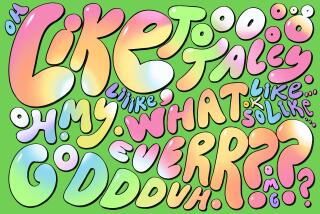Accent Is on Change in Vermont Dialect
- Share via
IRASBURG, Vt. — On the hill farms, in the small towns and among the people who live on the back roads of Vermont, the sounds are changing.
“Kiow” is being replaced with “cow.” More and more, the “L” is back in Milton and Randolph, and “roight” is being replaced with “right.”
The traditional Vermont accent is no longer the lingua franca of the Green Mountain State. In the small town of Irasburg, you can track the trend in the course of a brief stroll.
“The farm right here is 150 acres,” said Roy Ingalls, an 81-year-old Irasburg resident who has lived his whole life in an 1820s farmhouse off Vermont Route 58 between Irasburg village and Orleans.
To an outsider, his Vermont accent is classic. The words came out, “The fahm roight heaah is 150 akus.”
But down at the general store on the Irasburg green, the girl behind the counter speaks the unaccented English found across the Northeast. And over at the town offices, Town Clerk Barbara Lawson has just a hint of an accent.
Many say the influence of television, instant communication and a mobile society are erasing regional accents in the United States in favor of a single, bland national way of speech. But experts say that’s not the case.
Urban dialects, as accents are called by linguists, are becoming more distinct over time. The trend with regional rural accents is less clear, said William Labov, a linguist at the University of Pennsylvania.
“The most local dialects tend to disappear,” said Labov. “The regional [dialects] tend to stay” and consolidate.
It’s not clear what that trend means for the traditional Vermont accent. It’s changing, but that doesn’t mean it’s disappearing. In the same way that other symbols of bygone eras have become something new, the Vermont accent is evolving. It’s not a process that can be stopped.
“The more rural speakers have more extreme forms of the dialect,” said Julie Roberts, an assistant professor of communication science at the University of Vermont. “Rural accents are most pronounced in older men. Women have accents, but they tend to be less extreme.
“To some extent, it’s because women tend to be more in service-type organizations. Women need to sound of a higher social class,” said Roberts, who is studying how speech is transmitted from one generation to another.
Conversely, men might need the heavier accent because it helps mark their membership in a particular group, she said.
Listen to Ingalls, a man who has always lived in the farmhouse where he and his sisters were born and where his mother died.
“I went over to Maine deer hunting for quite a few years and there was some folks over there that I hunted with, they’d invite me to their camp. And they’d laugh, you know, I’d say ‘rud’ for road and ‘kiow’ for cow.
“I went over once and, of course, when we’d get manure out and spread it, we’d call it ‘drawing manure.’ It’s just an old saying. And they’d laugh at me. ‘What the hang you mean “drawing manure?” ’ “ he said, laughing as he remembered.
Of course, it sounded more like this:
“I went ovah to Maine deah huntin’ for quite a few yeahs and thea was some folks ovah theah that I hunted with, they’d invite me to theah camp. And they’d laugh, you know, I’d say ‘rud’ for road and ‘kiow’ for cow.
“I went ovah once and, ah cowse when we’d get manuah out and spread it, we’d call it ‘drawin’ manuah,’ it’s just an old sayin’. And they’d laugh at me. ‘What the hang you mean “drawin’ manuah?” ’ “
While young Vermonters have an accent, few young people in Irasburg or other rural communities--even those who have never left the farm--will have accents as thick as Ingalls’.
Scientists measure accents by looking at how sounds are formed in the mouth, the way vowels and consonants are blended, and the other minutia of speech. All those sounds can be graphed and plotted with the precision of a chemistry experiment.
But Roberts is quick to say that the way Vermonters talk is not science; it’s a way of life.
“Language is very dynamic,” she said. Still, “if you do see something lost, it is a little sad.”
More to Read
Sign up for Essential California
The most important California stories and recommendations in your inbox every morning.
You may occasionally receive promotional content from the Los Angeles Times.












